Incels: Inside a dark world of online hate
- Published
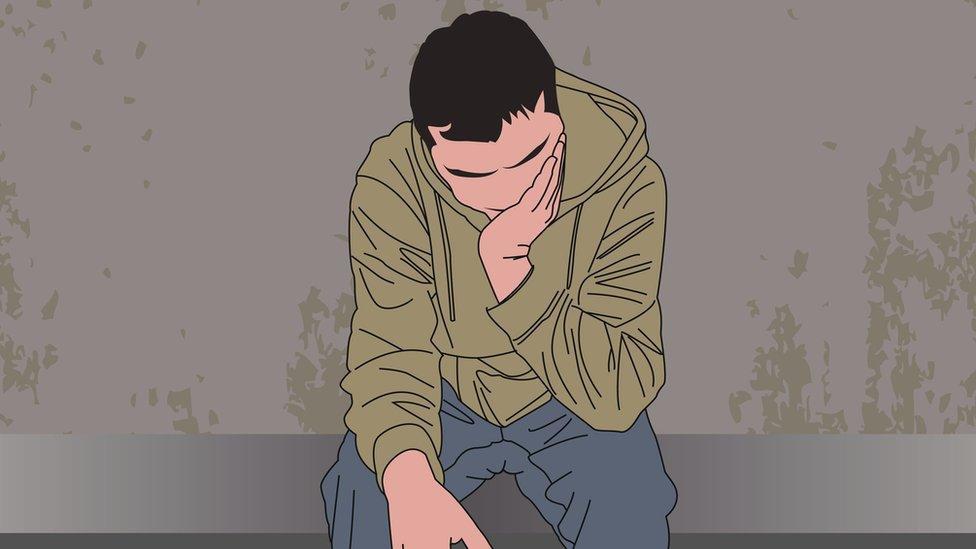
Jake Davison, the man suspected of killing five people in Plymouth had been active on social media platforms discussing the "incel" movement - young men describing themselves as "involuntarily celibate".
At least two previous mass killings, both in the United States have drawn attention to the online activities of these groups.
So what do we know about those who participate in these forums?
Failure and frustration
"Obviously I don't have much hope of attracting a woman in the first place."
Jack Peterson is one of the thousands of young men who visit forums on Reddit and other incel websites.
"I've had a couple of negative experiences in relationships and so that has made me feel, like you know... it's hard to move on from my past and start a new relationship," he says. "I've had women who have done pretty bad things to me."
These overall themes of failure and frustration - along with anger and hate - are common on incel forums. I spoke to several young men who call themselves incel. They're in their teens or early 20s and many have experienced rejection or negative encounters with women.
They go to message boards out of loneliness. What they find is a group of angry men pushing the idea that they have lost the genetic lottery, and there's almost nothing they can do about it.
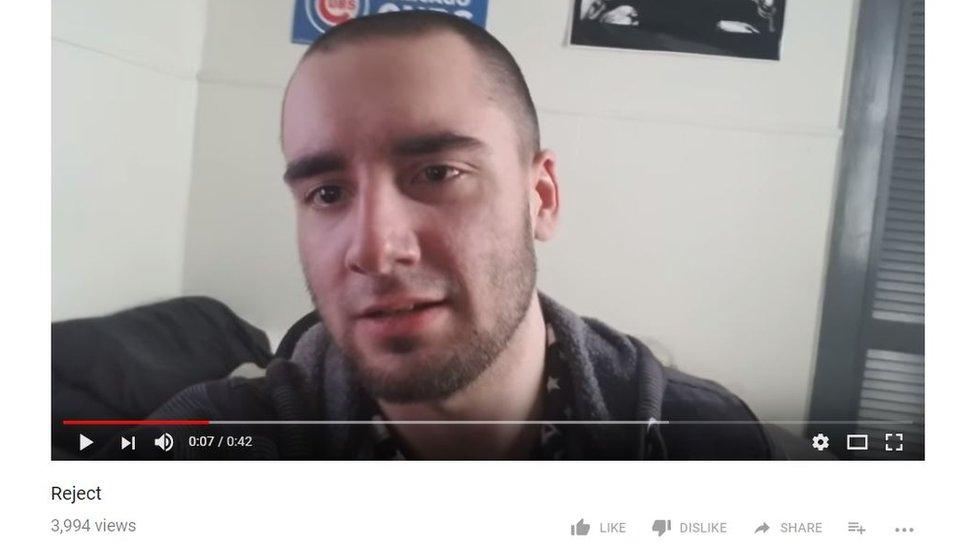
Jack Peterson has been one of the most prominent voices in the incel YouTube community
Jack has a YouTube channel and a podcast. He is one of very few incels prepared to speak to the media after the Toronto attacks in 2018.
Others agreed to speak if I changed their names. They're embarrassed because they're unsuccessful at relationships - but many are also hiding extreme views.
One incel from the UK - I'll call him Liam - has been active on forums from a young age. He's unemployed, and lives at home with his family.
He admits: "I've got this sort of misogynistic view which is not helping me in life, generally."
I ask him directly: does he hate women?
"In some ways, yes," he stutters. "I try not to, but I find myself like - I'll just be talking and I'll say things that I shouldn't really say, just because I've been looking at forums."


Our conversation is stilted, thoughts trail off and silences punctuate our interaction. I ask Liam what kind of things he says in real life that he thinks he shouldn't. He reels off several unprintable insults that he mutters at women. So is this behaviour a result of his time in incel communities?
"I guess I can't actually say if it's related, because when you're younger, you probably wouldn't end up saying those things anyway. But I guess I wouldn't have before.
"It's what these communities are," he adds. "It sucks you in so you get into this echo chamber of people who experience similar problems.
"You think one small [thing]... then you get other people thinking far more radical things. So you then think the small things are acceptable."
The radical things Liam talks about are in plain sight on incel message boards.
Sex and genetics
The idea that all women are money-grabbing, promiscuous and manipulative comes across strongly on incel threads, where attractive women in particular are referred to as "Stacys".
"Stacys" are objects of both desire and ridicule. In their world, incels believe "Stacys" will always choose so-called "Chads" over them.
A "Chad" is a caricature of a sexually successful man. And comparisons are not just about personality or confidence. Many incels believe they are genetically inferior to "Chads".
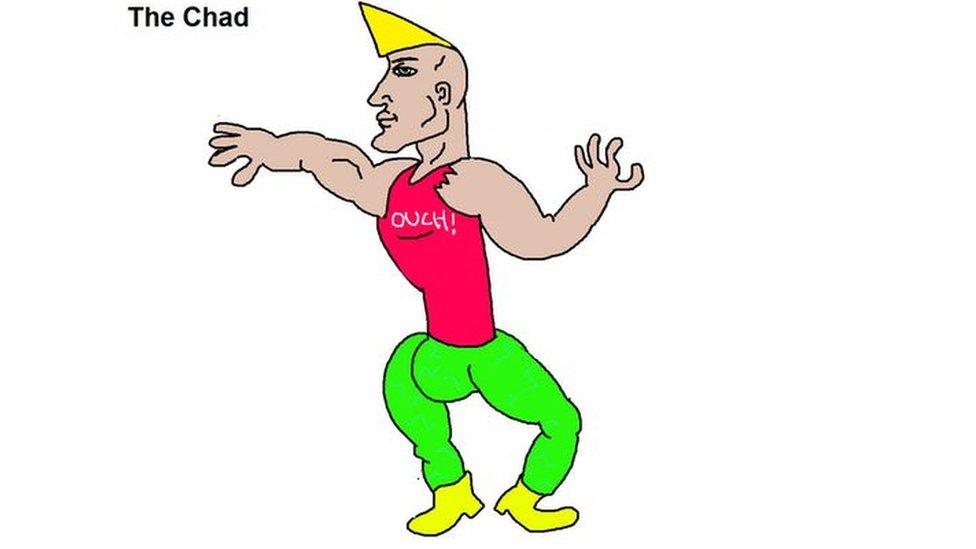
This crude cartoon of 'Chad' is used many incel memes
Chad is often depicted as a successful guy with swathes of blonde hair and pulsating muscles (which he shows off in neon green trousers). He has a sports car, but more than that, he also possesses a physical attribute incels envy - a chiselled jaw line.
These crude caricatures seem laughable - but they are important because they create an "us v them" mentality. Incels believe that sex, love and happiness are out of their reach, available only to others.
They're particularly drawn to the nihilistic "black pill" theory - the idea that they are the only ones who realise that the game of sex and attraction is rigged from birth.
Self-help or positivity is frowned upon on incel forums. Anyone who successfully interacts with women is instantly branded a "fakecel" - meaning "fake incel".

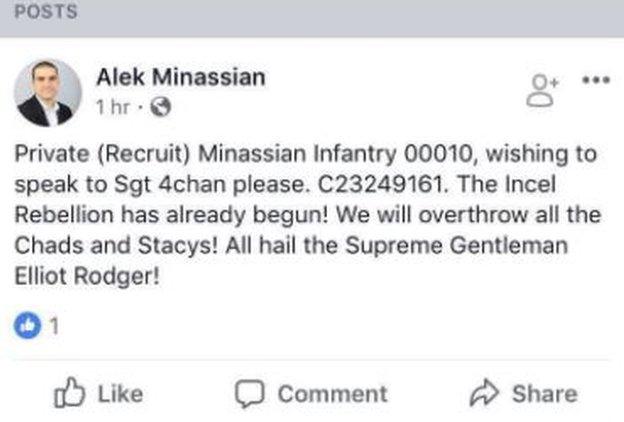
Alek Minassian posted this on Facebook shortly before the Toronto attack
Incel communities have developed on Reddit, Facebook, 4chan and on sites run by incels themselves. There are also counter-incel groups which ridicule their views. It's in one of these opposition groups that I meet an "ex-incel".
Matthew - again not his real name - found out about incels on 4chan, a freewheeling, often extreme message board. He is frank about what drew him in, aged just 15.
"I was quite overweight. I was very socially inept and my friendship circle was quite restricted," he reflects. "As a result, I was very insecure.
"Having someone who was a girl, who had broken my heart, just further strengthened that insecurity."
Over the course of a year, Matthew's attitudes towards women turned extreme.
"I had resentment towards a particular person," he says. "But after speaking to people on the internet, they tended to convince me that [cruelty] was a common attribute among women. Which is quite terrible, now that I think about it.
"It was this idea that all women were inherently manipulative. All women had an intent to exploit men."
Mass murder
A hero within inceldom - possibly a somewhat ironic one - is Elliot Rodger. In 2014, he killed six people and turned the gun on himself.
In a rambling manifesto filled with racist and misogynistic slurs, Rodger complained that women did not want to have sex with him.
Although the manifesto did not specifically mention incels, his actions are discussed constantly in incel forums. Sometimes the comments look like dark humour but at other times they appear more serious.
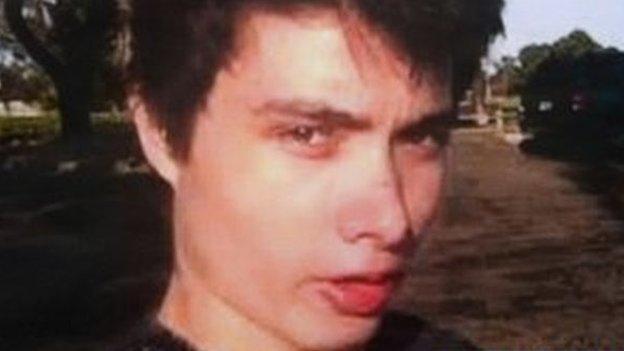
Elliot Rodger killed six people in a knife, gun and car rampage in 2014
I saw one forum thread where someone was saying they wanted to take their own life, and various commenters suggested violence.
One said: "DON'T be selfish. Go to an elementary school and kill some children before you commit suicide. Please!?!"
Messages like that aren't unusual in the incel community. When someone mentions that they have suicidal thoughts, they're often egged on by others in the group.
As we speak, Liam, the young man in the UK involved with incel groups, tries to joke about Rodger's murder spree.
"I don't think it was even that wrong," he says, laughing nervously. When I push, he does say: "It's common sense, it's wrong to kill people."
Incel forums, he admits, are not places to go to for support, if you're angry or having thoughts of suicide.
"People don't try and sugar-coat things in a way that conventionally people do," he says.
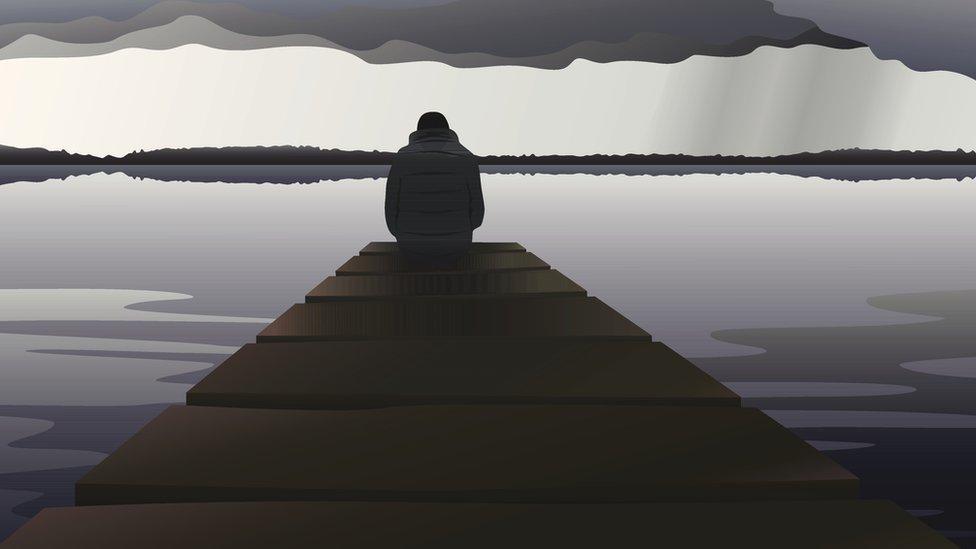
Keeping an eye on incels
Moderation of incel groups has been fairly lax. Reddit have made attempts to remove incel communities from their own platform, but many groups have remained online.
There are also individuals who keep tabs on incel forums.
I speak to Emily, a Canadian woman who has been observing the Toronto incel community for years. She even posed as a male on a Reddit account to try to engage with them. (Again, Emily is not her real name - she says she's received rape threats from incels).
Emily is particularly disturbed by conversations she's seen since the Toronto attack. While some incels are desperately trying to distance themselves from the attacker, others are undermining that message.
"The day after the attack I saw a British student who was an incel. He wasn't let into medical school because - he said - a woman interviewed him and thought he was too ugly to be a doctor," she explains.
"He was planning to kill himself that night and in the comments section were people encouraging him to take revenge and 'not go down alone'," she says.
"They're posting violent memes. They're encouraging each other to attack people and no-one is doing anything about it. If Isis was doing something like this, it would be shut down immediately and people would be arrested."
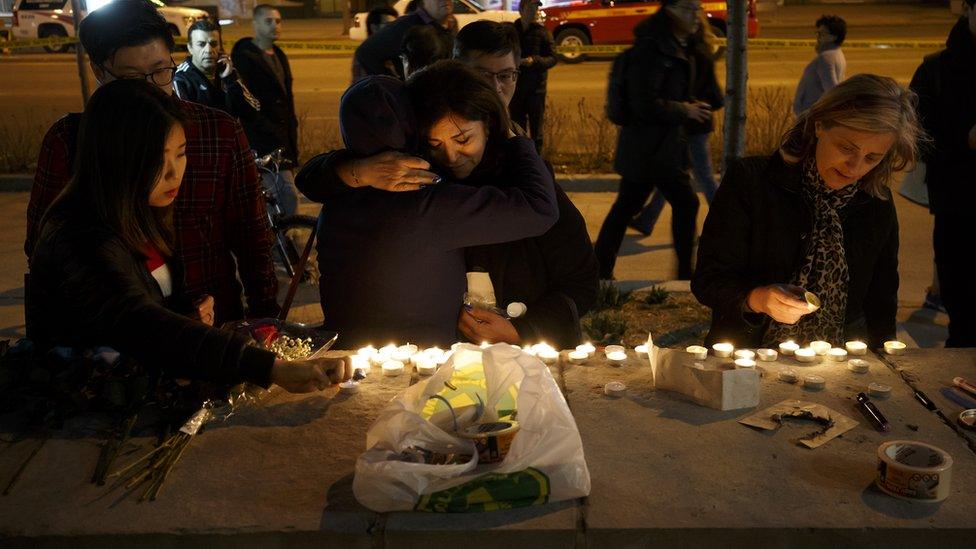
Mourners left candles and messages on Yonge Street in Toronto after the van attack in April
Emily says there is a particularly active incel community in Toronto - possibly because of the political climate in Canada, where the prime minister calls himself a feminist.
"I think people feel oppressed when equality is closer," she says. "So if you were once the king of the hill and now everyone's almost on your level, you feel threatened."
There also appears to be an overlap between incel culture and the hyper-nationalist, anti-feminist movement of the alt-right. Both movements view the world through the lens of group genetics, with racial stereotypes, and think of themselves as unfairly maligned minority groups under attack by political correctness. And they share the same sense of humour, which has practically no filter.
Matthew, the ex-incel from Australia, turned away from the movement partly because it morphed into something political.
"Back then it wasn't nearly as hostile as it is today," he recalls. "There's instigators - people on these forums who ignite feelings of anger. They push people into often reactionary movements, most commonly the alt-right."
"I stopped calling myself an incel at the end of 2016. That's when political discourse began to become quite heated in Australia," he recalls. "They tended to just blame everything on women."
Matthew is at university now, and says meeting new people has made it easier to socialise and talk to women. But he worries that other incels who are more reclusive may find it difficult to change.
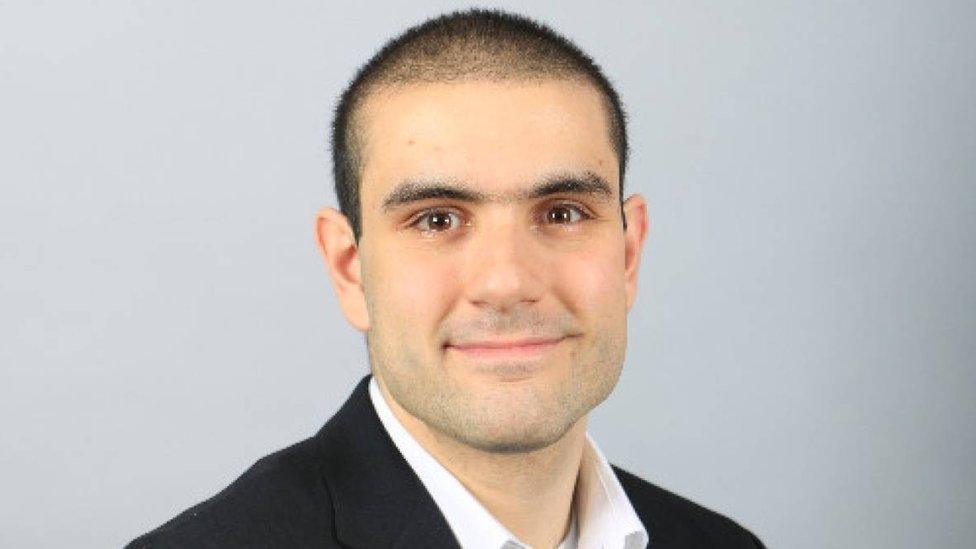
Police arrested Alek Minassian within half an hour of the Toronto attack
Moving away
Amid all of the hatred online, the recent attention in the wake of the Toronto attack appears to have prompted some incels to have a change of heart.
A few days after I interviewed him, Jack Peterson uploaded a video titled: "Why I'm Leaving Incels, external". I rang him again, to ask why.
"Just being productive, and busy, and going downtown, and travelling, and meeting a bunch of different people," he says. "Talking to CNN, BBC and the Sun has made me realise that my regular daily life is very boring and monotonous.
"And it kind of made me realise that I can't really go back to sitting on a forum all day, talking about how miserable I am, and making podcasts about it. I have to make a change.
"Even if you're just some random guy who lives with his mom, and makes videos about how you're a loser, you can still have some small impact on the world. So it just gave me confidence."
After all the media attention, Jack noticed that he was getting good feedback from unexpected sources.
"I was getting positive comments from random feminists and leftists. And the incel community itself was telling me to kill myself. I was like... maybe this is not healthy for me."
And Emily, the Canadian woman, shows a surprising amount of empathy for a community that expresses such extreme views. I ask her what she would say to incels reading this story.
"If you project love into the world, you'll receive love back," she advises. "If you're negative towards women they will never, ever want to have a relationship with you.
"So you need to do a lot of soul searching. The world isn't a hateful place. People are friendly. You're not ugly. You matter."
Additional reporting by Elizabeth Cassin
This article was first published in May 2018 and has been updated.
Blog by Jonathan Griffin, external
You can follow BBC Trending on Twitter @BBCtrending, external, and find us on Facebook, external. All our stories are at bbc.com/trending.